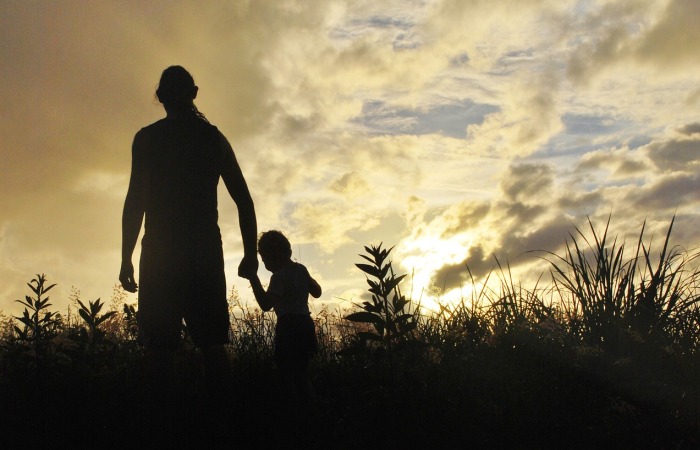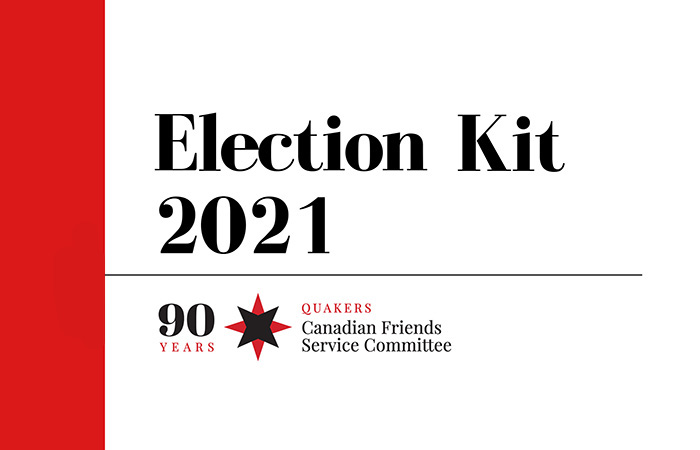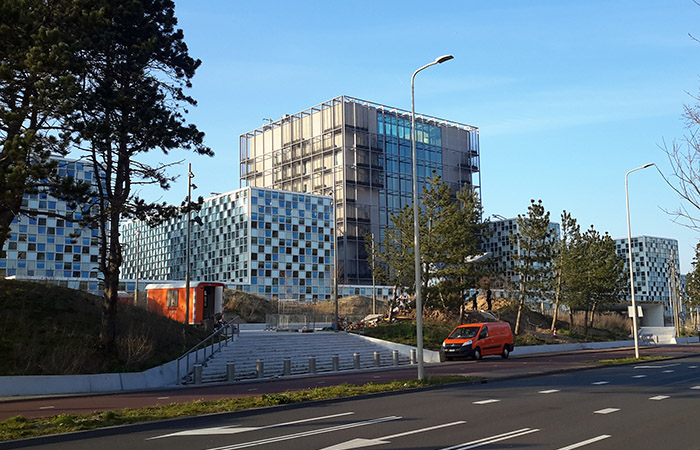
Realizing children’s rights in Canada
August 4, 2021
Calling for parties running for election to shift to a shared security approach
August 20, 2021A federal election has been called for September 20. This kit by Canadian Friends Service Committee—the national peace and social justice agency of Quakers in Canada—is here to help you ask candidates informed questions about the issues we work on. You can read the kit below, or download it in PDF to make it easier to print and share.

Peace
Military spending
Canada’s 2017 defence policy Strong, Secure, Engaged promised a massive 73% increase in military spending, mostly to buy new fighter jets, warships, and armed drones.[1] Critics point out that the actual price tag would be many times more than the defence policy’s figures.[2]
The August report from the Intergovernmental Panel on Climate Change paints a stark picture about our beautiful world being in its last possible decade to avoid the most catastrophic impacts of the climate crisis.[3]
As wildfires and droughts cause incredible havoc, Canada does not need new expensive military hardware that will emit more carbon while continuing to lock us into a failed vision of security. Fighter jets and armed drones will not keep Canadians safe. Security includes climate security. We need to invest in an urgent shift to a peaceful and green economy.
Question:
- Will you commit to ending the procurement of new military hardware and instead invest these hundreds of billions into meeting Canada’s climate commitments under the Paris agreement?
Arms Trade Treaty
Canada continues to be a major arms dealer. The UN has singled out Canada as helping to fuel the brutal Saudi-led war in Yemen.[4]
An August 2021 report details how Canada is failing to live up to its legal obligations under the Arms Trade Treaty by continuing to sell weapons to Saudi Arabia.[5]
Questions:
- Will you ensure that Canada respects international law including the Arms Trade Treaty by ending Canada’s arms sales to human rights abusers like Saudi Arabia?
- Will you invest in supporting Canadian factories to convert from arms production to peaceful green production?
Department of Peace
Canadians want Canada to be a peace leader on the international stage. In addition to the moral imperative to do so, the UN and World Bank provide a strong economic case for war prevention even benefitting countries not directly involved in wars.[6]
Canada has no government body tasked with making violence prevention a top priority. The Canadian Peace Initiative seeks to establish a Cabinet-level Minister of Peace within the Government of Canada, and a federal Department of Peace. The Department would make Canada a leader in developing and implementing a coordinated and coherent approach to violence prevention and peacebuilding domestically and internationally.[7]
Questions:
- Are nonviolent strategies for addressing conflict adequately emphasized and resourced within Canada? What would you change?
- What is your position on the establishment of a Canadian Department of Peace or other means to address root causes and prioritize the prevention of violent conflict?
Israel/Palestine
See Vote Palestine, an elections resource endorsed by CFSC and put together by Canadian faith, human rights, and social justice groups working on Palestine/Israel issues: https://www.VotePalestine.ca
Indigenous Peoples’ Human Rights
UN Declaration on the Rights of Indigenous Peoples
The Truth and Reconciliation Commission called the United Nations Declaration on the Rights of Indigenous Peoples the “framework for reconciliation.” The UN Declaration provides the necessary principles, norms, and standards for reconciliation to flourish in twenty-first-century Canada. In June we celebrated Royal Assent of Bill C-15, An Act Respecting the United Nations Declaration on the Rights of Indigenous Peoples.[8]
Question:
- Will your party, in consultation and cooperation with Indigenous peoples, take all necessary steps to ensure the full and effective implementation of the new legislation, including: development of a national action plan and ensuring that the laws of Canada are consistent with the UN Declaration on the Rights of Indigenous Peoples?
Missing and murdered Indigenous women and girls
Question:
- In June 2019, the Missing and Murdered Indigenous Women and Girls Inquiry report, Reclaiming Power and Place was released. Concerns have been raised about the pace of action following this report. What will you do to work with Indigenous peoples to enact the Calls to Justice listed in the report?
Truth and Reconciliation Commission Calls to Action
Questions:
- What will you do to, in consultation and collaboration with Indigenous peoples, do the significant remaining work to fully implement the 94 Calls to Action of the Truth and Reconciliation Commission of Canada?
- What will you do to work with other jurisdictions to ensure that all of the Calls to Action are implemented?
- How will you ensure that all the resources needed to address the discovery of children’s graves will be made available as requested, and that all supports needed for communities will be provided?
Criminal Justice
Public Safety
The police-reported crime rate in Canada decreased by 10% from 2019 to 2020 (according to Statistics Canada, July 2021). Canada spends more than 2.5 billion dollars on its federal prison system each year. This expense has increased while Canada’s crime rate has declined. Spending on prison security, courts, and policing diverts funds from more effective programs and services that address the root causes of crime and support healing and rehabilitation for offenders, victims, families, and communities.
Most people released from prison return to the community with few supports, and face a lack of housing, income, healthcare, and social services to help them with reintegration. This leads to an increased risk of re-offending and limits opportunities for promoting positive life changes and desistance from crime.
Questions:
- All members of Parliament have access to correctional facilities. Have you ever been inside a prison? Have you spoken to people inside prison?
- Justice is often viewed through one of two lenses: one is focussed on punishment, the other is focussed on healing and is restorative, seeing crime as part of a bigger social problem. How does your party feel about the current level of investment in these two approaches?
- What changes would your party propose to the current criminal justice system?
- Courts in Ontario and British Columbia have found that Canadian prisons consistently use prolonged solitary confinement, in violation of Canadian Charter rights. This is a long-standing issue. What does your party propose to do about this violation of human rights in Canada?
- The Reduction of Recidivism Framework Act came into force in June. The legislation calls for the use of multiple measures to “ensure that all people who are incarcerated have access to appropriate programs that will help reduce recidivism.” How does your party intend to develop and implement the Reduction of Recidivism Framework Act?
- Canada has a clear over-representation of Indigenous people in prisons, particularly Indigenous youth and Indigenous women. What does your party intend to do to reduce the over-representation of Indigenous persons in the Justice system?
- Many people with mental health or substance use issues are not provided adequate healthcare in the community, and there is little healthcare available if people go to prison. The Mental Health Commission of Canada states that Canadians with mental health issues “should be able to expect timely access to high-quality services—on par with those available for physical illness—no matter where or when they need them.” Does your party have any policies in relation to mental health and addiction healthcare, both in the community and in prisons?
Children and youth
Canada has ratified and championed the United Nations’ Convention on the Rights of the Child (UNCRC), including to protect and promote the best interests of the child. When we look at the impact on children whose parents are sent to prison, there is no indication that children are taken into consideration in our criminal justice system.[9] This impacts more than 350,000 children in Canada each year. Often children enter child welfare because their parents are in prison, and this particularly affects Indigenous children.
Questions:
- Does your party have any plans to address the impacts of parental incarceration on children as per Canada’s international obligations?
- If passed, Public Senate Bill S-210, an Act to Establish the Office of the Commissioner for Children and Young Persons in Canada would provide a mandate to promote and protect the rights, well-being, and views of children and youth, especially those who belong to a vulnerable group. The Commissioner would be required to collaborate with Indigenous governing bodies to include Indigenous views and values in advocacy for Indigenous children and youth. Does your party agree that children and youth in Canada need a National Children’s Commissioner? What steps would your party take to move this Bill forward?
Additional resources
You may be interested in these election kits from our partners:
- Canadian Coalition for the Rights of Children
- Canada-Wide Peace and Justice Network
- International Civil Liberties Monitoring Group
- John Howard Society of Canada
- KAIROS Canada (PDF)
End notes
[1] Canadian Friends Service Committee, “Our Questions about Canada’s Defence Budget,” September 5, 2017, https://quakerservice.ca/news/our-questions-about-canadas-defence-budget [2] No Fighter Jets Coalition, From Acquisition to Disposal: Uncovering the true cost of 88 new fighter jets, 2021, downloaded from https://NoFighterJets.ca [3] See https://www.ipcc.ch [4] Steven Chase, “Canada is Fuelling War in Yemen with Arms Sales, UN Report Says,” The Globe and Mail, September 9, 2020, https://www.theglobeandmail.com/politics/article-un-experts-report-on-yemen-war-names-canada-as-one-of-arms-suppliers [5] Steven Chase, “Canada Flouting International Law by Continuing Saudi Arms Sales, Report Says,” The Globe and Mail, August 11, 2021, https://www.theglobeandmail.com/politics/article-canada-flouting-international-law-by-continuing-saudi-arms-sales-new [6] World Bank Group and United Nations, “Pathways to Peace: Inclusive Approaches to Preventing Violent Conflict,” 2018, https://openknowledge.worldbank.org/handle/10986/28337 [7] See https://CanadianPeaceInitiative.ca [8] For more about the significance of this legislation see joint statements by the Coalition for the Human Rights of Indigenous Peoples at https://DeclarationCoalition.ca [9] See our report Breaking the Silence: Dialogue on Children of Incarcerated Parents and our submission to the UN Committee on the Rights of the Child regarding the children of incarcerated parents in Canada.



